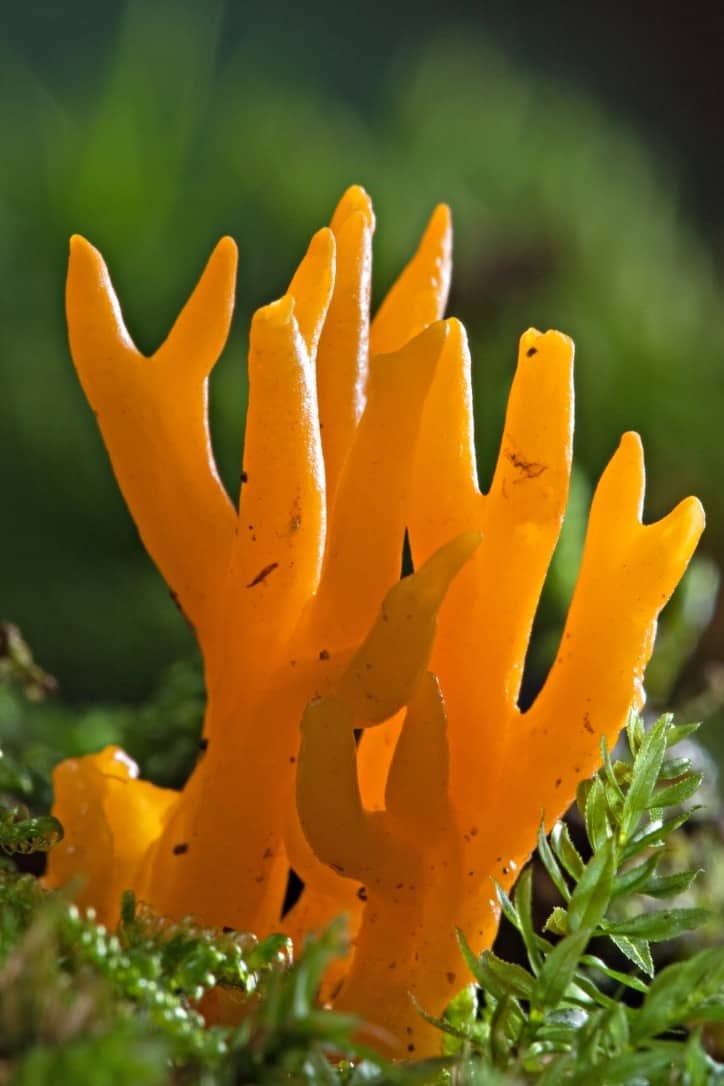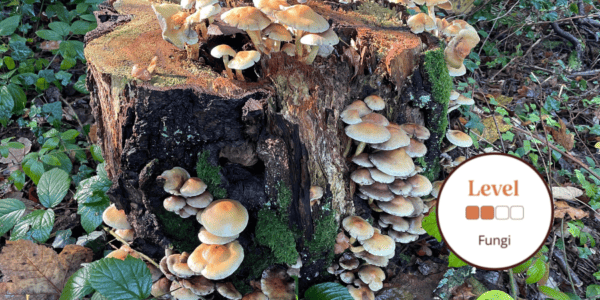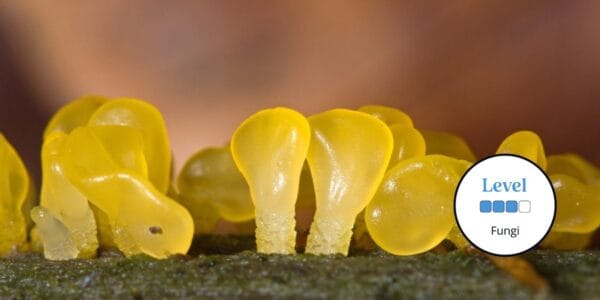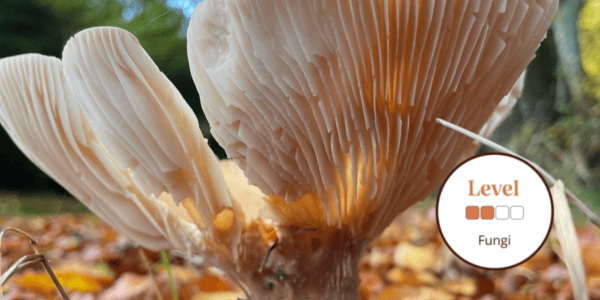This course on identification of macrofungi is for those who are interested in fungi, have some basic experience of trying to identify them e.g. using a pictorial field guide or participating in local group recording forays, and would like to take their identification skills further.
By the end of the course participants should know how to set about the identification process, be able to place fungi into correct major groups and be able to identify many of the more commonly occurring to at least genus level. We will also gain an understanding of the importance of these species for ecology, conservation, and recording. The course will cover:
- Identification: During this course you will be taking part in excursions to be allowed time to practice observing in the field.
- Collection and Recording: You will take part in the collection and recording of fungi in the field.
- Laboratory Sessions: There will be opportunities to take part in laboratory sessions including use of keys and microscopy.
Your course takes place on a 12-hectare estate, surrounded by a rich range of habitats, including the River Severn and semi-ancient woodland, set in the heart of Shropshire with views disappearing into Wales.
PLEASE NOTE the course fee is for tuition only. If you would like to book accommodation and meals, including packed lunches, at Preston Montford please email [email protected] Please book early to ensure availability of accommodation.
Who Should Attend?
Natural history enthusiasts, students, rangers, ecologists, environmental professionals. This intermediate level course is open to anyone with some knowledge of the subject.
Knowledge Level – Intermediate. Level descriptors can be found on the following webpage: Framework and Course Level Descriptors
What will be covered during this course?
The course will be delivered through a combination of seminars, laboratory identification sessions and practical field work. Field work will involve visiting a range of habitats where the specimens can be identified within an ecological context.
- Defining fungi, how their life cycle differs from other groups, how they fit in with other groups of organisms
- Classification of fungi
- Study of their structure and function
- Identification, description, ecology, distribution, with particular reference to the mushrooms and toadstools
- Focus on the more easily identifiable groups i.e. larger Basidiomyctes
- Field techniques for the identification of macro features
- The role of fungi as saprophytes and parasites, fungal ecology
- Fungal distribution with reference to climate, edaphic factors and host species
By the end of the course, you will be able to:
- Define the diagnostic features of a range of macrofungi, identify species using appropriate tools and describe the general morphology and life cycles of macrofungi.
- Compare the ecology and distribution of selected macrofungi and criticially evaluate the roles they have as ecological indicators.
Accreditation
This is one of a series of courses (Units) run jointly with Manchester Metropolitan University contributing to the MSc Biological Recording and Ecological Monitoring and the Postgraduate Certificate in Biological Recording. MMU students complete assessed work after the course. For further details about Manchester Metropolitan University degree programmes please contact:
Department of Natural Sciences, Manchester Metropolitan University, (Shrewsbury Office). Email: [email protected]
- See the ‘Example Timetable’ and ‘What’s Included’ sections below for more information about this course.
- Upon booking you will need to provide individual details of all attendees
- Please email [email protected] if you have any questions.
Assessment
For Manchester Metropolitan University students, the Unit will be assessed through, for example, identification tests, survey reports, field journals, production of keys, essays or other forms of assessment. In course tests are optional and less formal for participants who are not MMU students.
MMU students will be required to complete a portfolio comprising of two parts:
Part 1: Complete an identification assessment with the aid of any field guides/keys or notes. Justify your identification of each specimen using the most important diagnostic features. (Equivalent to 500 words)
Part 2: Collect a number of macrofungi specimens identified and fully labelled. Prepare voucher sheets for each species with appropriate information and layout, detailing key diagnostic features. The assessment will involve comparing and contrasting the features of different species. (1500 words)
Tutor: Jeanette Maddy
Jeanette Maddy is the Chair of North West Fungus Group, an active recorder and field surveyor and an Associate Tutor with Manchester Metropolitan University for the MSC Biological Recording Course.Book with Confidence
We understand the difficulties of making plans in the current situation when guidelines continue to change, and insurance conditions are being tightened. In response, we will continue to offer additional flexibility. Find out more here
Example Timetable
Example Timetable
This timetable is subject to change but should give an outline of what to expect.
If you have booked accommodation and meals with the centre your bedroom will be ready from 3.00 pm onwards on the day of arrival and we ask that you vacate by 9.30 am on the morning of departure.
If numbers are sufficient a station pick up will be arranged at 5.30 pm from Shrewsbury Station.
The evening meal is at 6.30 pm (not included in the course fee - please book separately).
The course starts after dinner with a classroom session 7.30 pm - 9.00 pm
The course ends at 4.00 pm on the final day.
Time will be made available for eating packed lunches during the day (not included in the course fee - please book separately).
Friday
Introduction to fungal classification, structure and ecology. Describing fungi.
Saturday
Laboratory session on how to collect fungi and take field notes. Field trip then making spore prints, describing field collections and using identification resources. Learn how to use microscopes and prepare material for examination. In the evening there will be a talk and an option to do more identification work.
Sunday
Field Trip then laboratory work on identification. In the evening there will be presentations where attendees show one or more fungi which they have identified at least to genus level and justify or explain the identification.
Monday
For credit students there will be a short test. Otherwise continue lab work, practice microscopy and/or foray around Preston Montford. Rounding off the course will be a short talk on fungal recording. Course finishes around 4 pm.
What's Included
What’s included?
- Classroom learning covering the theory of the subject
- Field excursions to apply new knowledge
- Expert tuition for which the FSC is renowned
- Clear objectives and progression
You can rest assured that the absolute best content from an expert in environmental education will be provided. In choosing an FSC course, you will be joining thousands of people who learn with us each year.
PLEASE NOTE the course fee is for tuition and refreshments only. If you would like to book accommodation and meals, including packed lunches, at FSC Preston Montford please email [email protected] Please book early to ensure availability of accommodation.
Before You Attend
There will be a member of staff with first aid training and access to a first aid kit on site. If you have special medical or access requirements, please let us know as soon as possible so we can make any necessary adjustments.
What to bring
- Simple collecting equipment such as a small pocket knife, paper bags and pots (empty film containers, margarine tubs etc.), basket, compartmented box.
- Camera/phone for photography.
- Ruler and looseleaf A4 pad, field notebook.
- Hand lens x10.
- Packed lunch containers e.g. vacuum flask, sandwich box, water bottle.
- Warm clothing, waterproofs and stout footwear for the forays.
Recommended field guides and reading
Please bring your own field guides with you if you have them.
Collins Complete British Mushrooms and Toadstools: The essential photograph guide to Britain's fungi (Collins Complete Guides) by Paul Sterry and Barry Hughes.
online reference (e-)book, David Moore’s "21st Century Guidebook to Fungi”
Older but useful field guides:
- Buczacki, S. (1992) Mushrooms and Toadstools of Britain and Europe. Collins
- Grunert, H. (1991) Field Guide to Mushrooms of Britain and Europe. Crowood Press
- Marcel, B. (1987) The Mushrooms and Toadstools of Britain and Northern Europe. Hodder and Stoughton
- Phillips, R. (1981) Mushrooms and other Fungi of Britain and Europe. Pan
General interest background reading:
Merlin Sheldrake’s "Entangled Life”
Peter Marren’s "Mushrooms: The natural and human world of British fungi" (British Wildlife Collection)
Paul Stamets’ “Mycelium Running”
Sorry this course booking is closed




